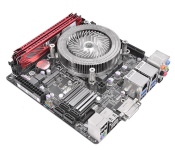Is that...a heatsink-fan in a single unit? Looks awesome but what's the point?More than likely based on older, low clocked, engineering samples if they have anything to go by. considering they have no clock speeds showing.
Nothing but speculation no doubt.
Also talking about CPU's look what i spotted! https://www.chiphell.com/article-17282-1.html
Someone finally made the spinning heatsink cooler into a commercial product!

-
Competitor rules
Please remember that any mention of competitors, hinting at competitors or offering to provide details of competitors will result in an account suspension. The full rules can be found under the 'Terms and Rules' link in the bottom right corner of your screen. Just don't mention competitors in any way, shape or form and you'll be OK.
You are using an out of date browser. It may not display this or other websites correctly.
You should upgrade or use an alternative browser.
You should upgrade or use an alternative browser.
*** AMD "Zen" thread (inc AM4/APU discussion) ***
- Thread starter Boomstick777
- Start date
More options
Thread starter's postsspotted something, estimated Cinebench R15, whose estimates? they are kinda low scores, the 8 thread Zen is about the same as the 8 thread Pildriver.

Not sure how you got that. A 9590 is about 700-800cb.
Anandtech review of the 9590
To me, those scores look very nice especially looking at the prices.
Is that...a heatsink-fan in a single unit? Looks awesome but what's the point?
Direct heat removal from the surface of the heatsink. there is often air stuck in a layer over the heatsink even when you blow a fan against it, acting as an insulating layer.
It also stops the majority of fouling that occurs to heatsinks due to dust.
Is that...a heatsink-fan in a single unit? Looks awesome but what's the point?
Well they advertise it as being 1U so... servers?
Well they advertise it as being 1U so... servers?
1U is a form factor, so yeah servers but also compact itx systems.
spotted something, estimated Cinebench R15, whose estimates? they are kinda low scores, the 8 thread Zen is about the same as the 8 thread Pildriver.

1300pts same score as 6850K, Piledriver doesn't even come close to a Intel hex. Still a large difference from AMD's marketing comparing it to 6900K though.
Soldato
- Joined
- 5 Sep 2011
- Posts
- 12,874
- Location
- Surrey
Who knows. Might be baloney.
Was playing with the Thermal Control tool earlier. Wonder if AMD's TDP dynamic turbo works in a similar fashion...
For those that haven't played with this and in case it's not clear; the control tool is set to lower the voltage and multiplier when the upper package temperature limit is reached.
So in this case:
4.5Ghz 1.38v
If package temperature reaches higher than 60c: 4.4 @ 1.34v
Works great for light loads, but would be nice if Zen gave you the option to play in a similar fashion.
Uncore and memory frequency overclocking range on Intel parts.
Was playing with the Thermal Control tool earlier. Wonder if AMD's TDP dynamic turbo works in a similar fashion...
For those that haven't played with this and in case it's not clear; the control tool is set to lower the voltage and multiplier when the upper package temperature limit is reached.
So in this case:
4.5Ghz 1.38v
If package temperature reaches higher than 60c: 4.4 @ 1.34v
Works great for light loads, but would be nice if Zen gave you the option to play in a similar fashion.
Interesting, why would you suggest that. I mean the i7 7700k has L3 cache of 8MB and 256KB of L2 cache would put that well below that of what AMD are doing.
Or are you basing this of older architecture from AMD?
Uncore and memory frequency overclocking range on Intel parts.
Last edited:
Can't see the image but are you comparing a 4c/8t Zen with a 4-module Piledriver?
No, the 4 core 8 thread.
Not sure how you got that. A 9590 is about 700-800cb.
Anandtech review of the 9590
To me, those scores look very nice especially looking at the prices.
FX-8350 scores 640.
Those estimates are consistently 25% slower than Intel, they are not benched results, the question is who is estimating and how?
Um, you say "no" and then say what I said? Even more confused now.No, the 4 core 8 thread.
Um, you say "no" and then say what I said? Even more confused now.
You said 4 module Piledriver (8 cores), he clarified he meant a 4c8t one as far as I can see. Which makes no sense as there is no 4c8t Piledriver :S
Um, you say "no" and then say what I said? Even more confused now.
Sorry, the low end 4 core 8 thread Zen has an Estimate of 700 pints in Cinebench R15, by comparison the FX-8350 scores 640, also on the slide the 6700K scores 900.
the top end 8 core 16 thread Zen is estimated to score 1300, also on the slide is the 6900K scoring 1635.
Soldato
- Joined
- 5 Sep 2011
- Posts
- 12,874
- Location
- Surrey
At what clock speeds? If that was a 3.2 GHz 4c/8t Zen then it sounds spot on to me, for example.Sorry, the low end 4 core 8 thread Zen has an Estimate of 700 pints in Cinebench R15, by comparison the FX-8350 scores 640, also on the slide the 6700K scores 900.
the top end 8 core 16 thread Zen is estimated to score 1300, also on the slide is the 6900K scoring 1635.
Listed as ?, its unknown.At what clock speeds?
In fairness it's actually an okay price, it just seems low due to Intel's reign of pricing terror.
To clarify what I mean by that, accounting for inflation $300 would buy you:
2001: 1c1t CPU
2003: 1c2t CPU
2005: 2c2t CPU
2007: 4c4t CPU
2009: 4c8t CPU
2011: 4c8t CPU
2013: 4c8t CPU
2015: 4c8t CPU
Only having to spend £250 for a 6c12t CPU in 2017 is about right (and would be very welcome if accurate), or maybe a tad expensive, it just appears ridiculously cheap due to how long Intel's monopoly has been skewing the price/performance landscape.
So where exactly do you expect we 'should' be core/thread wise in another ten years according to your fantasy CPU roadmap? 32 cores?, 64 cores? or more for consumer cpu's?
Perhaps if you aquainted yourself with Amdahl's law# you would realise that for most consumer workloads, where few CPU workloads can be run even 50% in parallel , that there's not much to be gained going much beyond a 4c8t CPU. Of course despite what some people may think some contemporary CPU's do show big advantages from those of just a few years ago only in different areas like incorporating more powerful igpu's and massively dropping power consumption for some previously power hungry scenarios' (I.e Kaby lakes ability to decide .h265 using very little power)
http://www.pcworld.com/article/3113...-chip-is-a-must-have-for-4k-video-fiends.html
In reality adding mores cores won't help, 6c12t is probably going to be the optimum going forward for some time. Core speed drops as you add more cores and as above unless you can get a program to run in a highly parallel fashion then you at very limited in the gains you can realise anyway by adding more cores.
But don't just take it from me see here for a developer for Elite, a game more suited to parallel operations then most, take on the problems with getting more performance from increases core count
'- Multithreading complex code is hard - Multithreading complex code which is scalable to many cores is harder - It is an unsolved problem'
http://www2.epcc.ed.ac.uk/downloads/lectures/BenNicholson/BenNicholson.pdf
Here's a pretty good web page exploring why max CPU clock speed increases have largely stalled.. All down to physics ... Not board room decisions or companies 'holding back'
https://www.comsol.com/blogs/havent-cpu-clock-speeds-increased-last-years/
Of course if it wasn't for the big drops in the £/$ exchange rate in the last 16 months or so a £250 6c/12t CPU in 2017 wouldn't be all that special. You could buy a 5820k on ocuk for sub £300 in September of 2015....
https://web.archive.org/web/2015100...roductlist.php?groupid=701&catid=6&subid=1672
That one of the main reasons i think the top end ryzen is likely to come in at £600+ inc vat... people forget how much the £ has slipped since they bought their sandbridge/ ivybridge/ haswell etc CPU's
Last edited:
So it tells us nothing then. Moving on...Listed as ?, its unknown.
So it tells us nothing then. Moving on...
Pretty much, tho those Cinebench estimates are an eye opener, reminds us not to build too much hope.
Last edited:



